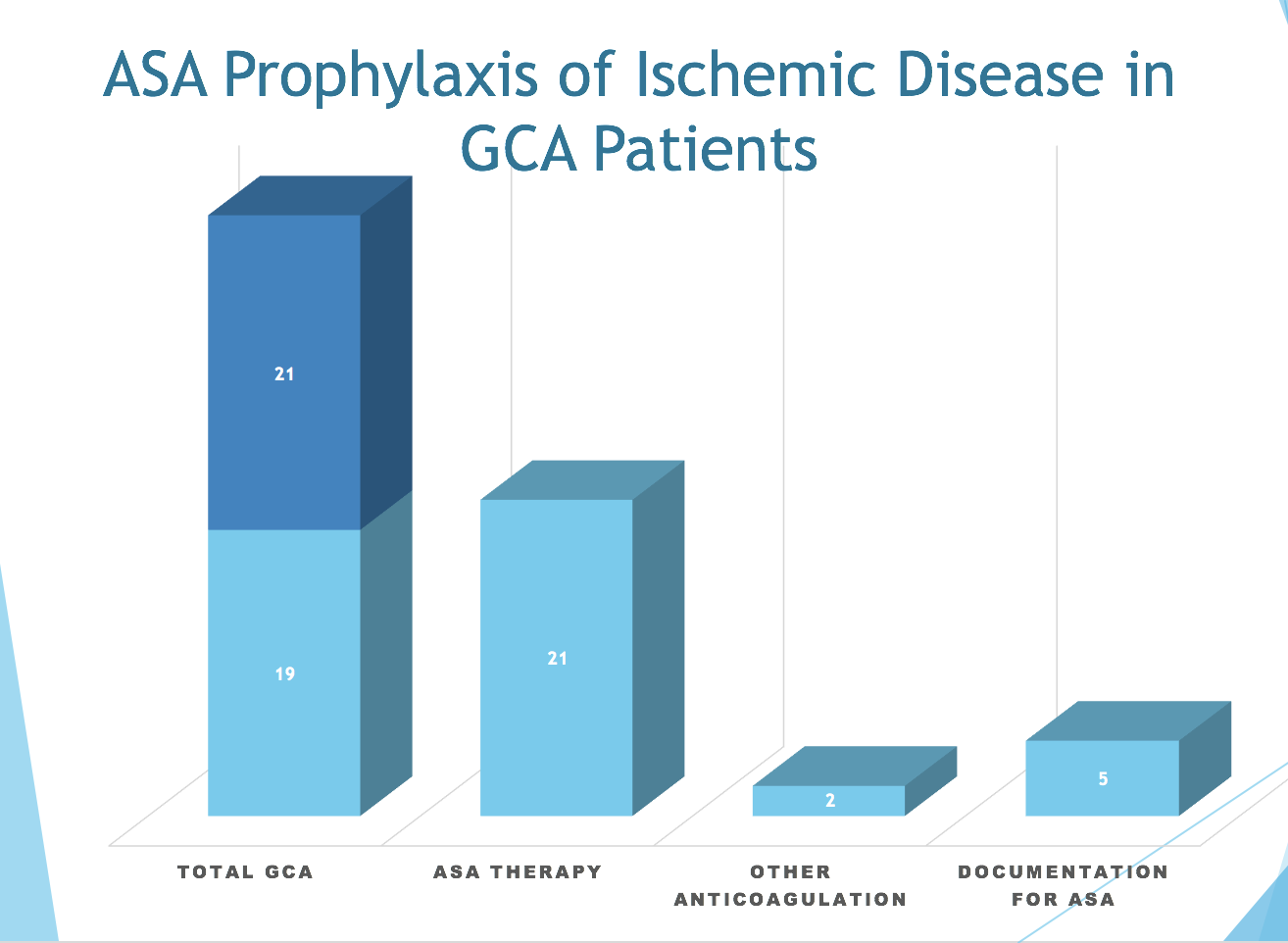Session Information
Session Type: ACR Poster Session C
Session Time: 9:00AM-11:00AM
Background/Purpose: The primary objective of this study was to better characterize the prescribed rates of aspirin prophylaxis for ischemic considerations in patients diagnosed with Giant Cell Arteritis (GCA). Secondary objectives included utilizing this functionality of the electronic health record to further characterize rates of biopsy-proven diagnoses, initial and alternative therapies offered, and incidence of ischemic events in patients diagnosed with GCA.
Methods: This study utilized the SlicerDicer capability of the Epic electronic health record at the University of California, San Diego. Encounters were reviewed individually to determine if patients met ACR criteria for the diagnosis of GCA. The above objectives were accomplished by reviewing all documentation regarding the indication of aspirin use in these patients, whether related to GCA or for other indications.
Results: 92 patients were identified through the overall query of the tracking tool for GCA of which 40 met ACR criteria for diagnosis of GCA. We found 52.5% (21 of 40) patients were identified to be prescribed aspirin with only 5 patient charts with distinct documentation for the indication of GCA. Two additional patients were on other forms of anticoagulation. Five patients suffered either strokes or transient ischemic attacks, of which 4 of 5 were before or the presenting feature of GCA. One was secondary to inappropriately stopping anticoagulation for atrial fibrillation. Only three of the four were prescribed aspirin prior to the documented event. Of note, two patients were noted to have either active or history of gastrointestinal bleeds with aspirin started after a prolonged period. Lastly, 22.5% of patients failed prednisone as the initial therapy and required alternative treatments.
Conclusion: Our data demonstrated that 52.5% of patients who met ACR criteria for GCA were on ischemic prophylaxis therapy with aspirin and only 12.5% of these patients had documentation for why or why not aspirin was recommended. The majority of cerebral ischemic events preceded or served as a presenting manifestation of GCA in this cohort. Our data indicates that we have opportunity to improve the number of patients on prophylaxis with aspirin for ischemic disease in GCA.
To cite this abstract in AMA style:
Subash M, Tahir Z, Kavanaugh A. Prophylaxis of Ischemic Disease in Giant Cell Arteritis Patients: An Application of a “Big Data” Tracking Tool in the Electronic Health Record in an University-Based Medical Center [abstract]. Arthritis Rheumatol. 2017; 69 (suppl 10). https://acrabstracts.org/abstract/prophylaxis-of-ischemic-disease-in-giant-cell-arteritis-patients-an-application-of-a-big-data-tracking-tool-in-the-electronic-health-record-in-an-university-based-medical/. Accessed .« Back to 2017 ACR/ARHP Annual Meeting
ACR Meeting Abstracts - https://acrabstracts.org/abstract/prophylaxis-of-ischemic-disease-in-giant-cell-arteritis-patients-an-application-of-a-big-data-tracking-tool-in-the-electronic-health-record-in-an-university-based-medical/

